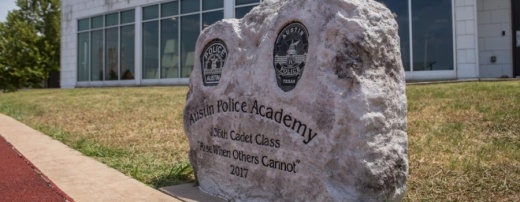Future cadet training was halted by council in 2019 after complaints of a toxic culture within the department were released, sparking both internal and external reviews of APD and eventual budget cuts aimed at cadet training through city officials' 2020 push to reimagine public safety. Most recently, a review of the APD academy including recommendations for its revival by the risk solutions firm Kroll Associates has shaped an ongoing overhaul of training and instruction leading up to the program's potential reboot.
Council members, city staff and representatives from Kroll and APD discussed the ongoing process during a May 4 council work session, ahead of council's May 6 consideration of a resolution that would kick off a pilot reimagined cadet training academy June 7 if approved. While funding for new cadet training this year had been removed through the city's original fiscal year 2020-21 budget, a $2.17 million transfer for the relaunch within the budget would facilitate the process, according to a city staff overview of the initiative.
Leading up to that potential start date, the academy is in the process of being redesigned in line with the latest guidance from Kroll to pivot away from its previous "stress-oriented, military-style" training in favor of an "adult learning" model. Interim Police Chief Joseph Chacon said that shift will move academy instruction away from a time when "lecture and listen" was the standard approach and toward lessons involving more student feedback and interaction.
"I can tell you when I went through the academy, that is not how it was. It was very structured and very disciplined, and we are going to be allowing people to ask those questions, to understand the ‘why,'" Chacon said. "That ... is really going to produce a better police officer."
Kroll Engagement Leader Mark Ehlers also highlighted willingness from APD and academy leadership to implement recommended changes such as involving more community input and participation at multiple levels; emphasize diversity, equity and inclusion in training; and focus on officer well-being and mentor programs as key changes within the academy. The academy was also lengthened by eight weeks since the beginning of Kroll's review process, Ehlers said, with new components such as a two-week orientation geared toward community immersion in Austin and hours of additional instructional programming.
Moving toward possible commencement
While not all of Kroll's nearly two dozen short-term recommendations for reopening the academy are complete as of this week, Ehlers said those benchmarks are on track to be met ahead of the academy's proposed June relaunch.
"We believe a state of readiness for the 144th cadet class is achievable by the start of this summer—with the caveat that there be an independent evaluation of the academy performing once it’s up and running," Ehlers said. "Ultimately a lot of hard work remains to be done to establish the long-term foundation for a resiliency-based, community-oriented police department, but we see no reason why this cannot be accomplished going forward.”
After providing council members with an analysis of the state of the 23 short-term recommendations outlined by Kroll, Chacon agreed that the dozen remaining items are on track to be implemented by early June.
"I want to assure [the] mayor and council as well as our community that we’re working diligently and urgently to fulfill our commitment to reimagining our cadet training academy, and that we are delivering instruction in line with the expectation that we are building efficient, capable, caring guardians of our community," Chacon said.
The potential academy commencement is proceeding despite some community reservations, however. While Kroll's review of the academy moved forward this spring, multiple working groups of the city's Reimagining Public Safety Task Force had requested additional reviews or a continued pause of the APD cadet training concept in their recently released mid-year report.
While a review of the academy's curriculum has been ongoing at APD with some community involvement, the Patrol and Criminal Investigations Working Group of the task force pitched the release of the full cadet curriculum and related teaching materials before any new training resumes. Both the Reimagining 911 and Non-Police Crisis Response and Patrol and Surveillance working groups also released recommendations for eliminating new cadet class funding, and members of the Uprooting Punitive and Harm Culture in Intersecting Systems Working Group said council "betrayed the trust of this task force and city by agreeing to a new cadet class against our unified recommendation" in their dispatch.
Council Member Alison Alter questioned Chacon on May 4 on another task force recommendation, from the Services for Survivors of Violence and Violence Prevention Working Group, relating to the number of hours of training by Victim Services Division required for both cadets and patrol officers to inform their work with violence survivors in the community. Alter noted the task force had recommended increasing academy training time involving Victim Services to 30 hours, which Chacon said was being addressed through two classes totaling 18 hours taught directly by division representatives in addition to their involvement in the curriculum review process and role-playing exercises.
Council members seemed generally supportive of plans to relaunch the academy May 4, with continued reporting on APD's progress both on the short-term academy goals and over the course of the first year of the pilot. Along with newly installed leadership at the academy and select monitoring from Kroll representatives throughout the relaunch, Chacon noted that additional community capacity for participation and review is being worked into instruction at the academy.
"We’re really leaning into all of the changes that our community would like to see be made with the Austin Police Department," Chacon said. "We still have a responsibility to maintain public safety, and we will maintain that responsibility, but at the same time that’s why we’re making the changes that we are to the academy. Because we do want to create those guardians and those caregivers; that really is their role the vast majority of the time.”





